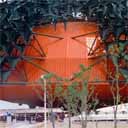0301 World's Fairs and Colonialism
Identifiers (Article)
Abstract
This survey on the history of world’s fairs since 1851 starts with the losers of this contest in national profiling and industrial competition: Germany and Austria, both former territories of the Holy Roman Empire and belated nation states. Both had been rather unlucky colonizers. Some of the leading colonial states, instead, organized more than three world’s fairs in the time span from 1851 until today: France, Belgium, and Spain, all of them Catholic. Holland, the Calvinist colonial power, renounced on this kind of spectacles at all, Great Britain contented itself with two performances. World’s fairs don’t pay off. While the USA participated regularly since 1876, two spectacular world’s fair events, Osaka 1970, and Shanghai 2010, mark the rise of the Asian powers. The history of world’s fairs mirrors global politics, diplomacy and wars against the backdrop of late colonial history.
Statistics


License

This work is licensed under a Creative Commons Attribution-NonCommercial-NoDerivatives 4.0 International License.



